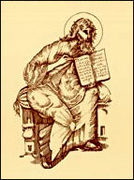Lectio Divina as School of Prayer
But all this is not to say that we must not approach Scripture with the intellect also. The monks are concerned to understand the literal sense of Scripture before applying it to themselves. In the Pachomian monasteries, for example, there were each week three catecheses in the course of which either the superior of the monastery or the superior of the house would interpret Scripture during the synaxis, after which the brethren would discuss among themselves what they had understood, in order to make sure that every one had been understood correctly.
The interpretation of a difficult text calls for an effort of the intellect; but this effort would be useless without divine light, which must be asked for in prayer. In this sense prayer ought to precede lectio as well as being its fruit. When two brothers questioned Antony on the meaning of a difficult text of the Book of Leviticus, Antony asked them to wait for some time, while he went to pray, begging God to send Moses to him to teach him the meaning of this text. (Arm. 12,1B: II, 148). Before him, Origen did the same, asking his disciples to pray with him to obtain understanding of a particularly difficult sacred text, in order, said he, to find the “spiritual edification” contained in this text. (L. Doutreleau, Origène. Homélies sur la Genèse. Trad. et notes — SC 7, Paris 1943, Hom. 2,3, p. 96). (Notice the expression “contained in the text”. The spiritual meaning of Scripture is not something artificially added to it; but something contained in the text, which must be discovered.)
 In the same way, a great monk, Isaac of Nineveh, wrote: “Do not approach then words of Scripture, full of mystery, without prayer… say to God: “Lord, make me perceive the strength that is to be found here.” (Voir J. Wensink, Mystic Treatise by Isaac of Nineveh (Amsterdam, 1923), par. 329, ch. XLV, p. 220). What we seek in a text is not an abstract, immaterial meaning, it is a power capable of transforming the reader.
In the same way, a great monk, Isaac of Nineveh, wrote: “Do not approach then words of Scripture, full of mystery, without prayer… say to God: “Lord, make me perceive the strength that is to be found here.” (Voir J. Wensink, Mystic Treatise by Isaac of Nineveh (Amsterdam, 1923), par. 329, ch. XLV, p. 220). What we seek in a text is not an abstract, immaterial meaning, it is a power capable of transforming the reader.
Modern theories on lectio divina generally insist on the fact that lectio is something completely different from study. The Fathers certainly would not have understood this distinction and this division into separate compartments. Their approach to Scripture was unified. Every effort to learn Scripture, to understand it, to put it into practice, was simply an effort to enter into dialogue with God and to allow oneself to be transformed by him in this dialogue which became a continual prayer. Neither they nor Origen, nor above all Jerome, for whom ignorance of the Scriptures was ignorance of Christ, (In Esaiam, Prol. CCL 73,2, CCL 78,66) would have understood a study of Scripture which was not a personal encounter with the living God.
For Jerome, prayer resides not primarily in the heart but in the intellect from where it goes into the heart. It is necessary to know God first in order to love him. He who truly knows cannot help loving. Hence the importance of studying deeply and understanding the Scriptures with the intellect.
Of Marcella, who more than all the other disciples of Jerome had studied the Scriptures in depth and read them assiduously, he said: “She understood that meditation does not consist in repeating the texts of Scripture… for she knew that she would only deserve to understand the Scriptures when she had translated the commandments into life.” (Ep. 127,4, CSEL 56, 148).
In his 14th Conference, Cassian, as a good spokesman for the spirituality of the deserts of Egypt where he lived for several years at the same time as Evagrius, distinguishes two forms of science, practikè and theoretikè, this last being the contemplation of things divine, and the understanding of the most sacred meanings. This theoretikè, or contemplation of things divine, he also calls “the true science of the Scriptures”, which he divides into two parts, the historical interpretation and the spiritual understanding. Both one and the other belong to contemplation.
Cassian adds: “if you wish to attain to the true science of the Scriptures, hasten first of all to acquire an unshakeable humility of heart. It is this that will lead you, not to the science that puffs up, but to that which illumines, by the consummation of charity.” Thus, what decides whether the study of Scripture is a contemplative activity or not, is not the method of reading or interpretation used, but the attitude of the heart.

Leave a Reply